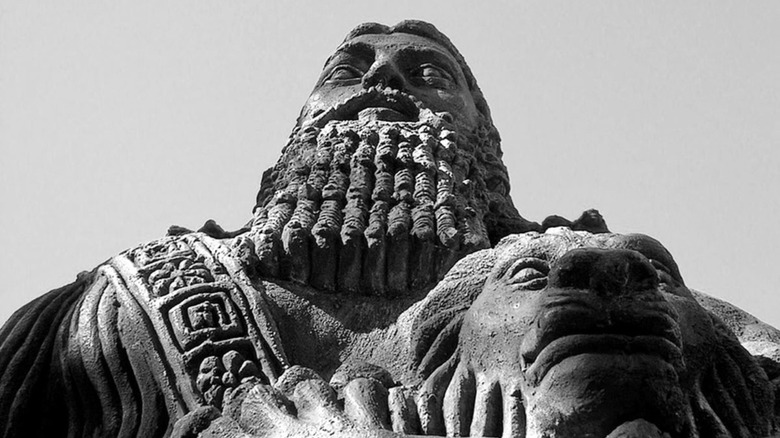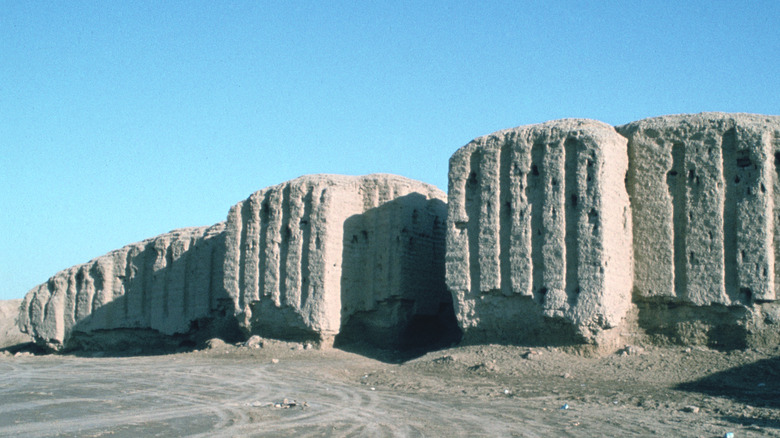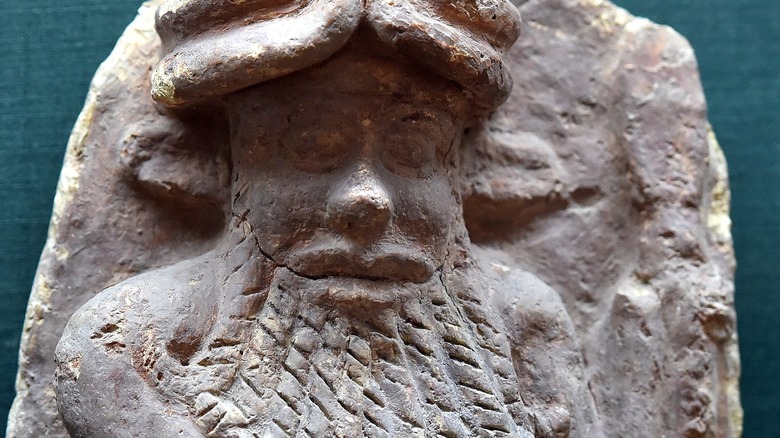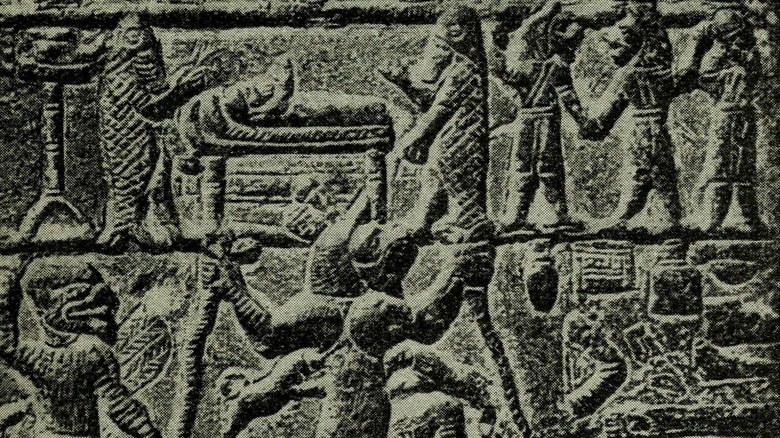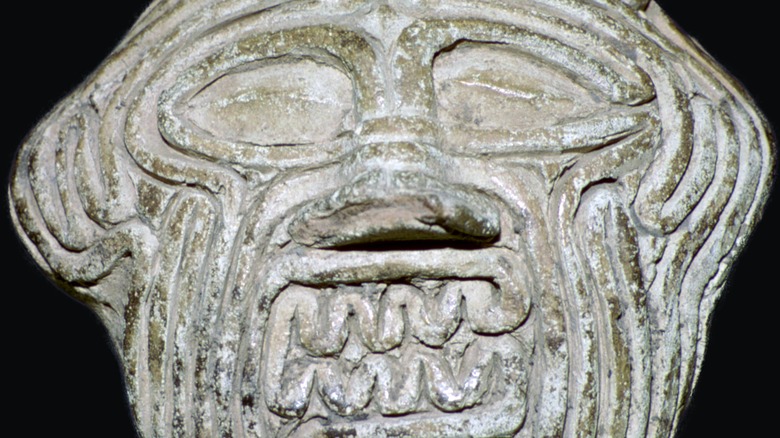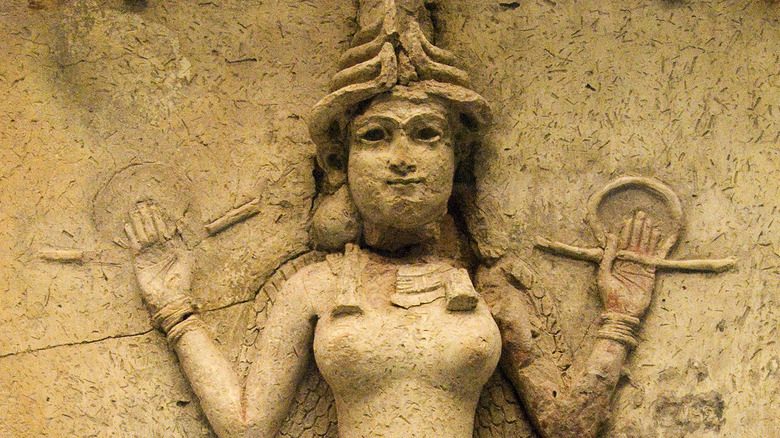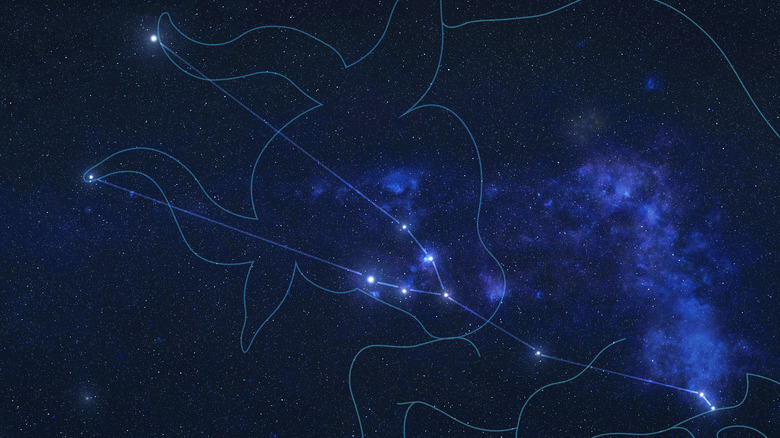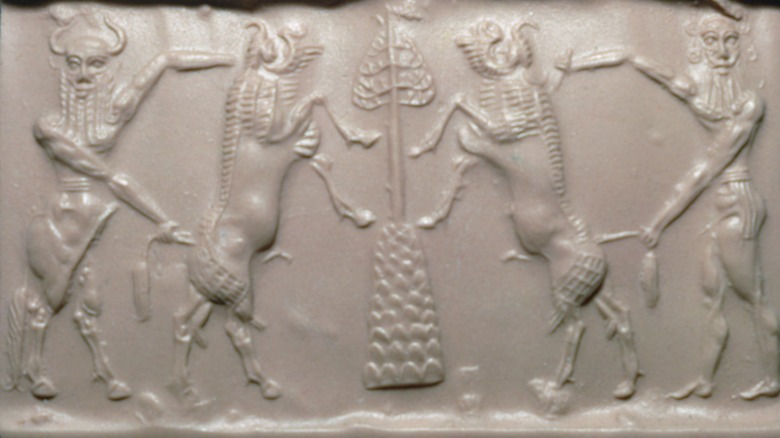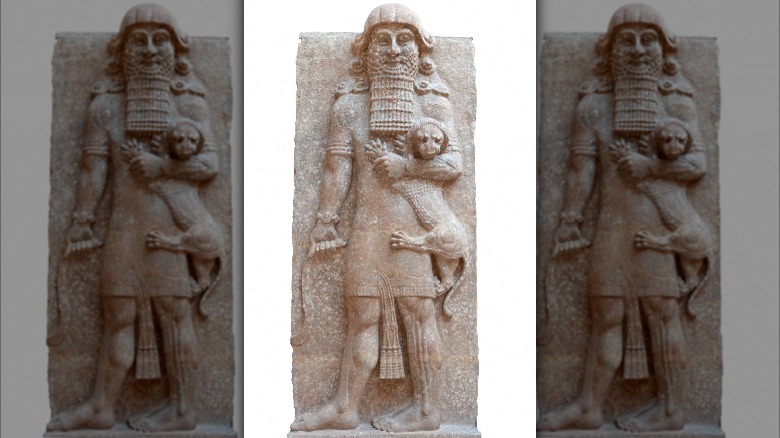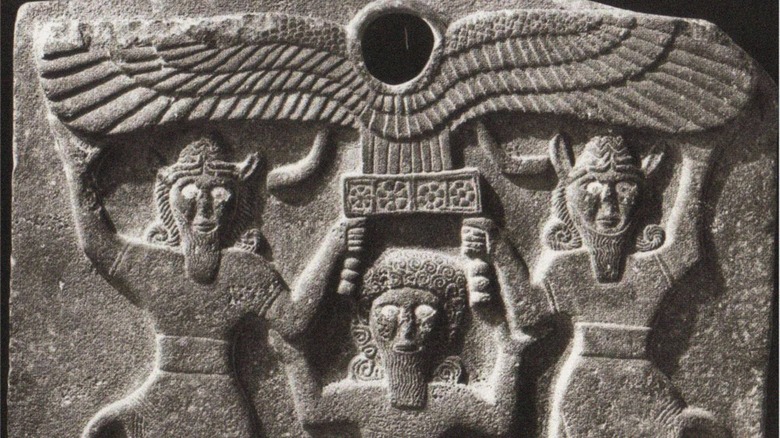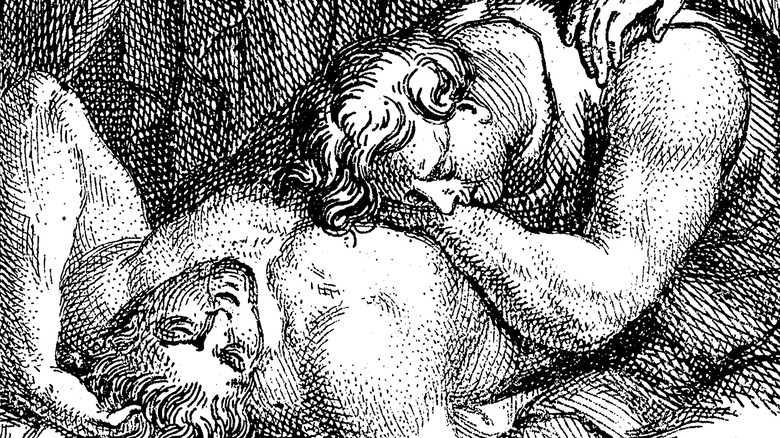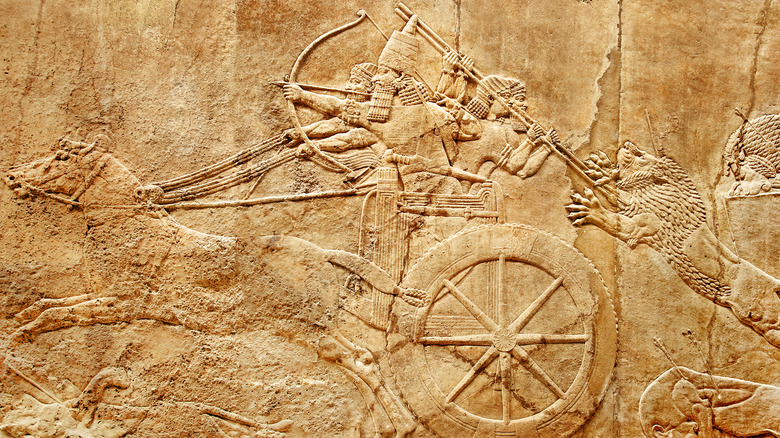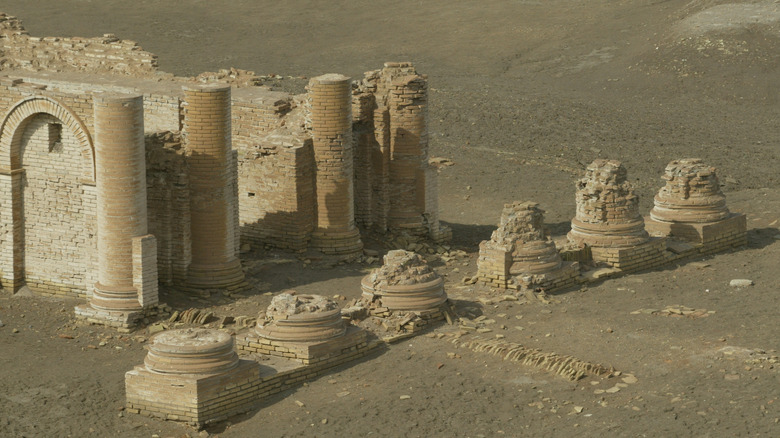The Myth Of Gilgamesh Explained
"The Epic of Gilgamesh" is sometimes called "the first story" in that it is the oldest story that has survived. As stated by History, the epic poem is believed to date back to the third millennium B.C.
The story was carved into twelve clay tablets, which were discovered by archeologists in the mid-19th century. While "The Epic of Gilgamesh" is Babylonian, legends about Gilgamesh date back to Sumer, which is believed to have been the earliest human civilization. Only fragments of their stories remain, but as explained in "The Death of Gilgamesh," there appear to be direct links to the epic. Some of the most famous events in "The Epic of Gilgamesh," like the hero's battle against the creature called Humbaba, seem to have originated as their own stories told in Sumer. It is believed that these early legends focused on the demigod Gilgamesh's strength and conquering of terrible monsters. The central theme of "The Epic of Gilgamesh" did not come from Sumerian legends, however.
"The Epic of Gilgamesh" is about a powerful king who deals with gods, defeats terrifying monsters, and searches for immortality, but the tale teaches that no one — not even kings and heroes — can conquer death.
Birth of Gilgamesh
In one version of Gilgamesh's origin, he was born in prison and survived an assassination attempt while he was still a baby.
Like the child-eating Ancient Greek god Cronus, Gilgamesh's grandfather was a Babylonian king that was deathly afraid of male heirs. He believed that if his daughter had a son, he would try to take the throne from him. As detailed in Part III of Steven D. Smith's "Literature and Culture in the Roman Empire," the king locked his daughter up, hoping that he could prevent her from ever having a son. Despite her father's attempts, the princess secretly gave birth to a son — Gilgamesh. His mother's guards attempted to kill the infant Gilgamesh by throwing him off of the acropolis of Babylon, but he was caught by an eagle and survived.
In another version, Gilgamesh is a demigod. In that case, as noted by The Met, Lugalbanda, the king of Uruk, is often depicted as his father, while his mother is Ninsun, a brilliant cow goddess.
Gilgamesh vs. Akka
Most of the stories about Gilgamesh are about slaying mythological creatures or dealing with conflicts with the gods. One short poem written about the great hero, however, is considered to be a depiction based on actual historical events. As described in Dina Katz's "Gilgamesh and Akka," this Sumerian poem tells the story of a conflict between Akka, the ruler of Kish, and Gilgamesh, the ruler of Uruk.
The story begins with Gilgamesh getting a message from Akka. Akka had ordered the people of Uruk to dig wells for the people of Kish. Gilgamesh was infuriated and refused to let the insult go. He gathered the city's fighters and declared war on Kish — but Akka got there first. Akka had his army surround the city of Uruk so that nobody could enter or exit. Trapped by their own gates with all their fighters inside, it seemed like it would be impossible to ever break the siege. Gilgamesh had a plan, however. He distracted Akka while his secret weapon smashed through the gates. That weapon: the wild man Enkidu.
Enkidu single-handedly captured Akka, ending the war in one move. Rather than having Enkidu kill his enemy, however, Gilgamesh tells Akka that he remembers that, before their feud, Akka had gone out of his way to help him. Akka surrendered to Gilgamesh, and he was allowed to return to Kish safely with his army — but without any new wells.
Wild Man Enkidu
Gilgamesh was such an unbelievably powerful hero that it seemed like there was nothing that he couldn't do. The people came to fear him, because there was no one in the world who could stop him from doing whatever he wanted — until Enkidu.
As detailed by Harvard University, the gods created a hero out of clay — one that would be just as powerful as Gilgamesh. They named him Enkidu — or "lord of the reed marsh" — and left him in the wilderness to become a wild man. All of Enkidu's friends were animals, but he had a human lover, and she told him stories about Gilgamesh's adventures, telling Enkidu that Gilgamesh must be even stronger than he is. Enkidu set out into the human world to find Gilgamesh and find out which of them was really stronger. Meanwhile, Gilgamesh was having prophetic dreams about a lover in the form of an immovable rock or a deadly axe.
On his journey to find Gilgamesh, Enkidu became enchanted by human life, wearing clothes and eating meals like an ordinary man. When Enkidu found Gilgamesh, the two had a brawl in the street. Eventually, Gilgamesh won and pinned Enkidu to the ground. Rather than being angry, the two were so impressed by each other's strength that they kissed. Rather than being Gilgamesh's enemy and keeping his power in check, Enkidu swore loyalty to the great hero. The two decided to go on adventures together.
The Netherworld
One of the most common adventures that epic heroes of the ancient world went on was a journey to the land of the dead. From Odysseus finding the spirits of his dead crew and mother to Hercules going to try to steal the King of the Dead's watchdog, almost all of the most beloved Ancient Greek heroes traveled to the underworld. While "The Epic of Gilgamesh" likely influenced all the epics that came after, Gilgamesh's refusal to face death is one of the central themes of the epic.
Unlike the Greek and Roman heroes who often traveled into the land of the dead for knowledge or to fulfill tasks set by the gods, Gilgamesh's journey to this underworld is set off by the king dropping something. As detailed by Harvard University, Gilgamesh and Enkidu were playing with a ball. Gilgamesh fumbled, and he accidentally dropped the ball all the way into the underworld.
In the story, which predates "The Epic of Gilgamesh," it is Enkidu who goes into the underworld (referred to as the "House of Dust") to get the ball back. In "The Epic of Gilgamesh," this story is reframed as a dream that Enkidu had — one which foretells his death.
Fighting a monster
It didn't take the two heroes long to find their new adventure. Enkidu told Gilgamesh about a place called the Cedar Forest, where no mortal was allowed to go. The woods were guarded by a powerful entity called Humbaba, who made birds sing and monkeys call. According to Harvard University, Gilgamesh took this as a challenge and was excited to test his strength in a fight with Humbaba. Enkidu wasn't as enthusiastic, but Gilgamesh insisted that he was not afraid of dying.
The Cedar Forest was beautiful and had the tallest trees that Gilgamesh had ever seen, but no sooner than they had reached the gates the mighty Humbaba attacked. As quoted by the BBC, the creature's "roar is a flood, his mouth is death and his breath is fire." Humbaba was so powerful that Gilgamesh worried that he had made a mistake, and he and Enkidu would be killed. He prayed for help. The sun god sent terrible storms to help the heroes, and Gilgamesh was able to behead Humbaba — but not before the forest guardian put a curse on Enkidu.
In some versions of the story, killing Humbaba is depicted as a terrible crime against nature, which both heroes come to regret. Enkidu is particularly disturbed by the outcome of their adventure, telling Gilgamesh, "We have reduced the forest to a wasteland. In your might you slew the guardian, what was this wrath of yours that you went trampling the forest?"
The goddess Ishtar
During his adventures, Gilgamesh encountered many gods and goddesses and hoped to become immortal like them eventually. As stated by Harvard University, one of the gods even planned to marry Gilgamesh.
The goddess Ishtar was beloved as the goddess of love and sex, but she also had power over war and death. As explained by Britannica, in some versions of her myths, she is the daughter of the king of the gods, the sky god Anu, but she was extremely powerful in her own right. Overtime, some would come to worship her as the most important god, known as "Queen of the Universe."
When Ishtar saw Gilgamesh, she became obsessed with him. She swore that if he married her she would shower him with gifts and make him the most powerful man to ever live. Gilgamesh had heard stories about Ishtar, however, and he knew that she usually tired of her mortal lovers quickly. Gilgamesh refused the goddess' proposal, and Ishtar swore revenge on Gilgamesh.
The Bull of Heaven
When Gilgamesh refused Ishtar's advances, as described by Washington State University, the goddess first threatened to cause a terrifying "Night of the Walking Dead." Ultimately, however, she settled on a different revenge — the Bull of Heaven.
As detailed in "The Bull of Heaven in Mesopotamian Sources," the Bull of Heaven is now commonly known as the constellation Taurus. The massive creature grazed on the horizon and belonged to Ishtar's father, Anu, the god of the sky. Ishtar borrowed the Bull of Heaven from Anu and sent it down to Uruk, and it instantly began devastating Gilgamesh's city. The massive bull ate all of the grass in the pastures and drank all the water in the river (which has been interpreted as an explanation for natural disasters that destroyed the land, such as earthquakes).
Gilgamesh and Enkidu went out to stop the bull. Enkidu was able to grab the rampaging bull by its horns and subdue it while Gilgamesh delivered a killing blow. They butchered the celestial beast and served its meat to the people of Uruk. Ishtar, who was watching the battle from the top of her temple, was furious that the bull had been killed. Enkidu threw one of the bull's haunches at her. As she fled, she put a curse on Enkidu, the same way that Humbaba had as he died.
The death of Enkidu
Soon after Gilgamesh and Enkidu killed the bull, Enkidu began having terrifying dreams. In the first, he dreamed that the gods had decided his fate. Because he and Gilgamesh had insulted the gods, killed the forest guardian, and eaten the Bull of Heaven, he would have to die.
As described by Harvard University, Enkidu was overcome with regret for killing Humbaba. He wished that he had never left the wilderness. Gilgamesh swore to him that he would be remembered in Uruk long after his death and honored with an enormous golden statue. Still, the nightmares continued. In one dream, Enkidu was caught by an enormous bird of prey with a lion's face that carried him to the underworld.
For 12 days, Enkidu suffered with the mysterious illness he had been cursed with. Finally, it killed him, and Gilgamesh was distraught. He spoke with the people of Uruk, the gods, the animals, and the rivers, and he asked them all to mourn for his friend. As he promised, he ordered a magnificent statue built so that no one would ever forget the hero Enkidu.
Trials for immortality
Enkidu's death sent Gilgamesh spiraling. When he had faced Humbaba, he had declared that he wasn't afraid to die, but with the loss of Enkidu he became terrified of death. He began to look for a way to become immortal. As described in "Gilgamesh: The Search for Immortality," Gilgamesh traveled a long way on his quest and was repeatedly told that he should give up because it's impossible to avoid dying. His journey was long and difficult, and it seemed Gilgamesh might die from exertion. But he was looking for one man in particular: Utnapishtim.
Utnapishtim was the only mortal who had ever become immortal. When Gilgamesh finally found him, Utnapishtim tried to tell him that "there is no permanence." Gilgamesh insisted that he had to learn the secret of immortality, so Utnapishtim set him a test: to stay awake for seven days straight. The hero tried, but couldn't do it. Utnapishtim suggested that he dive to the bottom of the ocean and bring back a plant that had the power to restore youth. Gilgamesh agreed, and managed to swim all the way down and find the mysterious plant.
When Gilgamesh returned to the surface, he finally was able to rest for the first time since Enkidu died. While he slept, a snake slithered by and took the magical plant. With the plant gone, Gilgamesh finally had to accept the truth: he was mortal and would someday die.
Death of Gilgamesh
While "The Epic of Gilgamesh" does not include a story of how its protagonist dies, an ancient Sumerian poem called "The Death of Gilgamesh" has been discovered. While it is badly damaged, scholars have been able to translate some of the end of the story.
"The Death of Gilgamesh" describes a scene that scholars have interpreted as taking place in The House of Dust after Gilgamesh's death. Gilgamesh is surrounded by his family and servants. His wives and children are presenting offerings for the gods of the dead. It is believed that after Gilgamesh's death, he became the ruler of the underworld — a king in death just as he was in life.
Because Gilgamesh is depicted as being surrounded by his entire court in the netherworld, some historians believe that the King of Uruk was buried with many, many servants to serve him in the afterlife. If this interpretation is correct, and the historical king's attendants were sacrificed to join him in death, it would be the earliest known example of human sacrifice.
An influential Sumerian hero
The legends of Gilgamesh originally come from Sumer, which is often referred to as the earliest civilization. As explained in "Heroes of Sumer: A New Heroic Age in World History," modern knowledge of their legends comes from stories carved in clay tablets. The first version of "The Epic of Gilgamesh" that has survived is from Old Babylonia, though, and over time, the story spread, with new versions emerging in multiple languages.
In "The Development and Meaning of the Epic of Gilgamesh," the epic is described as the hero's journey to accept death. Epic poems often follow the heroic exploits of a warrior — which "The Epic of Gilgamesh" does — but it also includes the consequences of these "heroic" deeds. And "The Epic of Gilgamesh" is far from the only work to function this way.
Like the wily Greek hero Odysseus, Gilgamesh changes as a person during his wanderings. Like the famous Greek warrior Achilles, Gilgamesh is forced to change because of the death of a loved one. This Sumerian heroic epic is thematically and structurally similar to other myths and legends from around the world, especially Greek epics like the "Iliad" and "Odyssey." This has led many scholars to deduce that these Sumerian epics were the first of their kind, influencing all those that came after.
Mesopotamian mythology
There are not many surviving stories from the time of the first Gilgamesh stories, but those that have survived share some pivotal themes with the famous epic.
As described by Britannica, "The Epic of Gilgamesh" shares its journey to the land of the dead with other Mesopotamian myths. In one story, the goddess Ishtar goes into the underworld and returns — fittingly called "Ishtar's Descent." "The Epic of Gilgamesh" also features a quest for immortality, another common thread in Mesopotamian myth. One story, known as "The Myth of Adapa," features a demigod who has to appear before the gods for breaking the wings of the South Wind. The gods offer him food that would make him immortal, but he refuses.
Like "The Epic of Gilgamesh," a legend found on clay tablets called "Enuma Elish" also deals with gods and kings. But it's a bit more than just that; it is a creation story for humanity and the world, and follows a god named Marduk on his rise to power.
A historic king
As with many early histories, it's difficult to determine what is fact and what is fiction. As detailed in Britannica, the characters in Mestopotamian stories frequently interact with gods and monsters. Seemingly historical legends about great victories by generals and kings are attributed to winning the favor of the gods. Rather than discrediting the historical value of these texts, the inclusion of religious elements and figures in depictions of these events shows the role that the mystical and religious held in this society. Alongside legends about Gilgamesh, detailed instructions for interpreting omens and prayers honoring specific deities have been discovered. Some believe that Gilgamesh himself is not just a mythological figure.
According to "The Sumerians: Their History, Culture, and Character," Gilgamesh is listed on the "King List," which details rulers of ancient cities. Gilgamesh was supposed to be the ruler of Uruk, which he ordered protected by an enormous wall. According to The Met, he would have been its ruler around 2700 B.C. It's possible that Gilgamesh was a real king who was mythologized in epic poems after his death. As noted by The Met, Shulgi, a king of Ur, even claimed that Gilgamesh was his brother.
